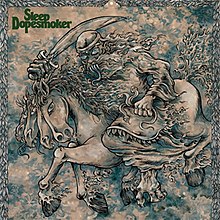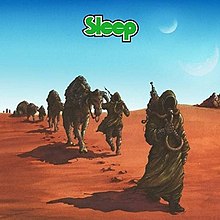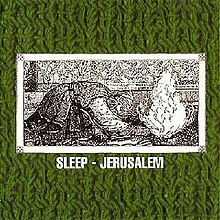Jerusalem (Sleep album)
| Dopesmoker | ||||
|---|---|---|---|---|

Dopesmoker (2003) album cover
|
||||
| Studio album by Sleep | ||||
| Released | February 2, 1999 April 22, 2003 |
|||
| Recorded | 1996 | |||
| Studio | Record Two Studio in Comptche, California | |||
| Genre | Doom metal, stoner rock | |||
| Length |
52:08 73:07 75:09 |
|||
| Label |
Rise Above/The Music Cartel Tee Pee |
|||
| Producer | Billy Anderson, Sleep | |||
| Sleep chronology | ||||
|
||||
| Reissue cover | ||||

Dopesmoker (2012) album cover
|
||||
| Jerusalem | ||||

Jerusalem (1999) album cover
|
||||
| Professional ratings | |
|---|---|
| Aggregate scores | |
| Source | Rating |
| Metacritic | 94/100 |
| Review scores | |
| Source | Rating |
| AllMusic | |
| AllMusic | |
| Consequence of Sound | |
| Decibel | (favorable) |
| Exclaim! | (favorable) |
| Mojo | |
| Pitchfork | (8.5/10) |
| Spin | (favorable) |
| Stylus Magazine | (favorable) |
Jerusalem and Dopesmoker are the final albums by the American heavy metal band Sleep. The albums were released in 1999 and 2003 respectively. The music for these albums was written during a four-year period when the group was working on a single song that was around an hour in length. Sleep had signed with London Records, which financed the album. When recording had finished, London Records was unhappy with the finished product and refused to release it. The album was later released in various forms by different record labels. All versions of the album received very positive reception from music critics, who described it as a high-water mark in both the stoner metal and doom metal genres.
After positive reviews from the heavy metal press and the release of the album Sleep's Holy Mountain (1993) on Earache Records, Sleep's label announced that they would release their follow-up record. Sleep had been touring in Europe with Cathedral and in the United States with Hawkwind in support of Sleep's Holy Mountain when the group felt they had to write new material. The new album was going to be an hour-long song. This song was written and practiced at sound checks, motel rooms and in friends' houses.Matt Pike said the songwriting process was long and that they were "working on [the song] for like four years. We also had two other songs that were working on that were really long, too—like 15 and 20 minutes. But we never recorded them."Al Cisneros stated that smoking cannabis was important to the song's creative process: "I was really dependent on the space I got into when I was using it, and some of the lyrics are about that...The line, 'Drop out of life [with bong in hand],' was kind of a creed at that point." The song was originally known and performed live under the title "Dopesmoker". After their tour, the group began to be interested in a Middle Eastern desert theme which led to Sleep referring to the song as "Jerusalem" during later practice sessions.
Sleep were ready to record the album in 1995 but did not record it until 1996 as the band was still contracted with Earache. Cisneros said that there was "about a year and half of legal wrangling between their managers and lawyers at Earache" and that Earache owner Digby Pearson "waited to make the most prime conditions for himself before he let [Sleep's] contract [go]." Sleep were in talks with both London Records and Elektra Records to release their next album. They chose to sign to London, as they were promised complete artistic freedom and more money, and since the label did not have any metal bands, Sleep felt they would receive special treatment. The members of Sleep were poor, and used the majority of money they received from London Records to cover for the debt they were in at that time.
...
Wikipedia
